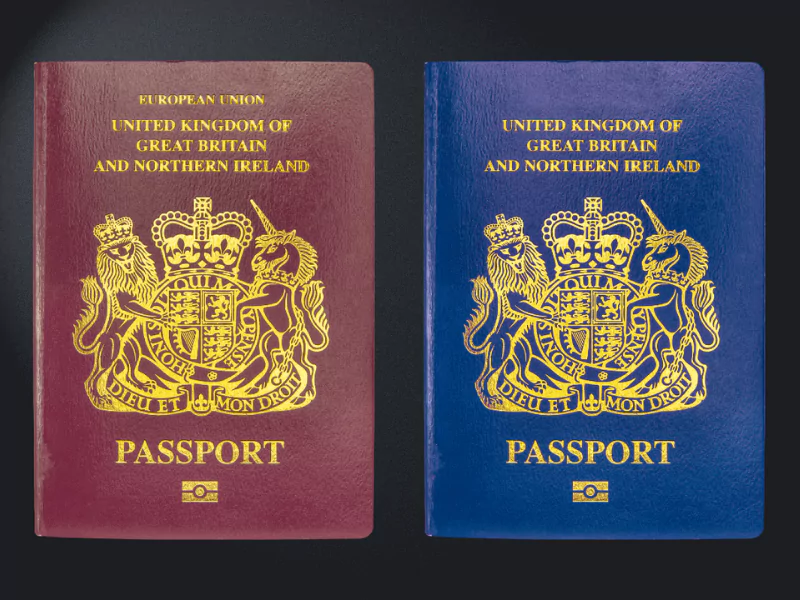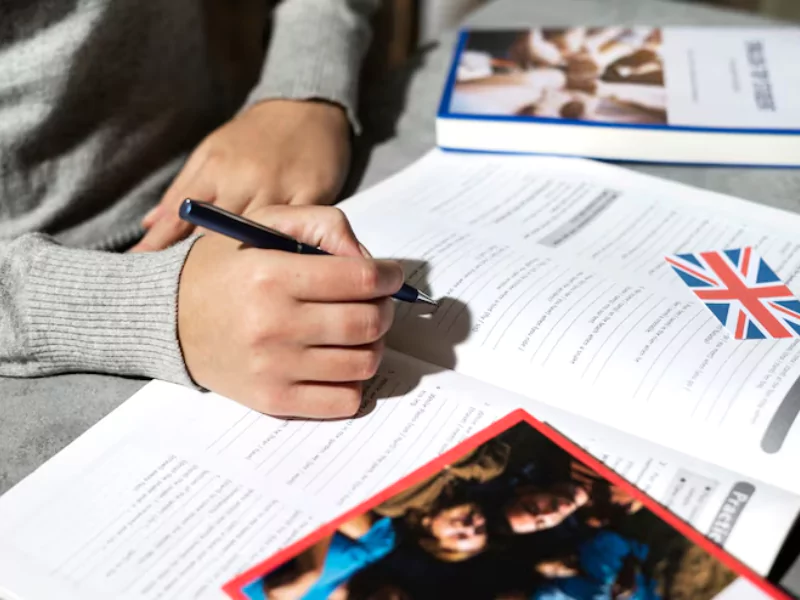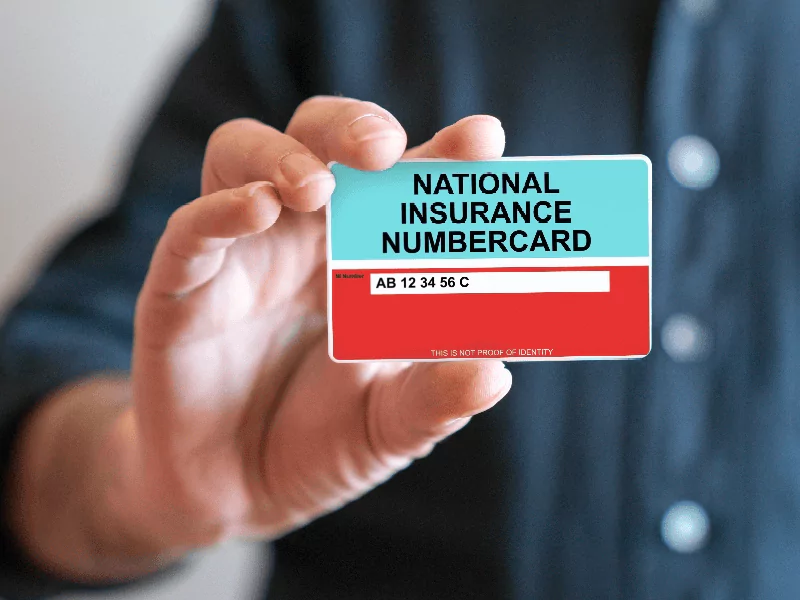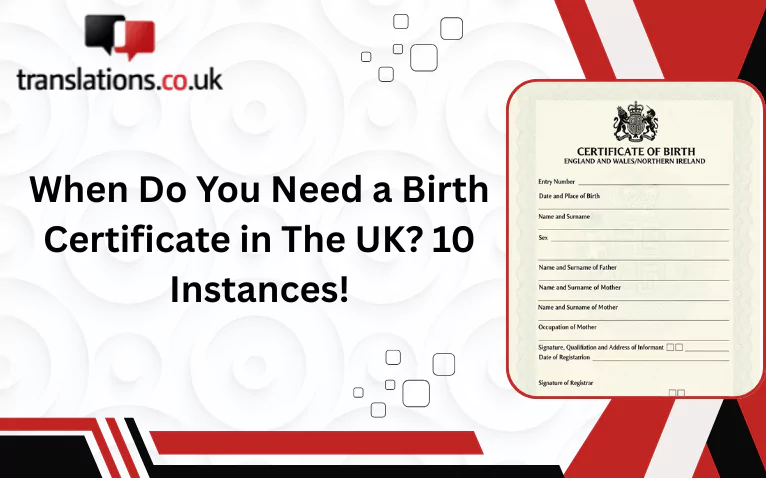Your birth certificate is more than just a record of your birth; it’s a fundamental part of your legal identity. But when do you need a birth certificate? While it may seem like a document that collects dust or is tucked away in some folder, it’s essential for many of life’s most important moments. From securing a passport to starting a new job, this document is the key to proving who you are. Discover the 10 crucial instances when you’ll need it.
What Is a Birth Certificate, and Why Is It Important in the UK?
A birth certificate in the United Kingdom is the official legal document recording a person’s birth. It serves as the primary and foundational proof of an individual’s legal identity, age, and nationality. In essence, it is the official proof of a person’s existence. When a birth certificate is issued in a language other than English, professional translation services UK are often required to ensure the document is legally recognised and accepted by government authorities, immigration offices, and other official institutions.
Births in the UK are officially registered at the local register office (where the baby was born). The original birth certificate itself is issued by the General Register Office (GRO) and provided by the local birth registration centre. This authority maintains a comprehensive record of all births registered in England and Wales since 1837.
There are two types of birth certificates in the UK: a short version and a long version.
Importance of a Birth Certificate
The importance of the birth certificate in the UK is paramount. It is the primary identification document used to establish citizenship and is essential for accessing a wide range of legal rights and public services, including the right to education, healthcare, and voting. Furthermore, a child’s birth certificate is a crucial document for obtaining other forms of identification, such as a passport or driver’s licence. If the certificate is issued in another language, an accurate birth certificate translation is often required to ensure it is accepted by UK authorities without delays or complications.
When Do You Need a Birth Certificate in the UK?
Here are the 10 instances when we would need a Birth Certificate in the UK:
1. Applying for a Passport

A birth certificate for passport application is a mandatory requirement for first-time UK applicants. Applications are submitted to the HM Passport Office along with supporting documents like countersigned photos. You would need a full birth certificate for this process, as it contains parental details which establish your citizenship status from birth.
2. Opening a Bank Account for Minors

For minors in the UK, a birth certificate is a fundamental requirement for opening a bank account. This is because applicants under 18 do not have the photographic documents like a Passport or a UK Driving license. In this case, the bank will view the birth certificate as the primary identity verification document. It not only helps the bank to confirm the child’s name & age, but also links the guardian (one of the parents) for managing the account through the parent’s details.
3. Getting School Admission

Also, a birth certificate for school admission is crucial. Generally, the Local Authority or County Council is responsible for coordinating state school admissions. It is required to officially verify your child’s age and legal name. This verification is crucial for placing your child in the correct academic year group and for establishing their permanent educational record.
4. Applying For Marriage Registration

Before any marriage or civil partnership in the UK, you must provide notice of your intention to marry to the local registrar. In this case, you would need a birth certificate for marriage registration in the UK. The registrar, the official who handles the process, has a legal duty to verify each person’s identity and legal eligibility to prevent fraudulent or invalid marriages. By checking the original birth certificates of both parties, the officer confirms their legal name, age and nationality before a marriage can be authorised.
5. Applying for a Visa

Next, you would need a birth certificate for visa application. This requirement applies to both scenarios:
- For UK Citizens Going Abroad: The embassy or the consulate of the destination country will require your birth certificate for identity verification. If a language barrier exists between two countries, then you may need to provide a certified birth certificate translation from English (source language) to the official language of the country (target language).
- For Foreign Nationals Coming to the UK: The UK Home Office will review the Visa documents, including the birth certificate, for the same purpose. Here, too, a need for a Certified Translation service enters the picture to have the foreign language document converted into English for official proceedings.
6. Private/Government Job Appointment

The need for a birth certificate for government jobs is another vital requirement. Sectors like the Civil Service (specifically the Home Office, Ministry of Defence, and Foreign Office), law enforcement, and the military conduct rigorous background and security vetting. If your employment covers any of these sectors, your birth certificate will be needed to prove your nationality and establish a consistent, verifiable identity from birth.
In fact, some private employers also require the submission of a certified copy of a birth certificate for ID verification. This requirement is most common in industries that are heavily regulated or involve a duty of care. For example:
- Education and Healthcare: Anyone working with children or vulnerable adults must undergo an Enhanced DBS (Disclosure and Barring Service) check. A birth certificate is a key “Group 1” document.
- Finance and Legal: Firms in these sectors require robust identity verification to comply with anti-fraud and money-laundering regulations. A birth certificate helps form a solid identity profile as part of their comprehensive employee background checks.
- Aerospace and Defence: Private contractors working on sensitive government projects must adhere to the same high security standards, making a birth certificate a necessary part of their vetting process.
7. Getting a Driver’s License

When applying for your first provisional driving license in the UK, you need to provide a birth certificate to the Driver and Vehicle Licensing Agency (DVLA). An official DVLA caseworker will meticulously review your birth certificate, confirm your identity and that you meet the minimum age requirements to hold a license.
8. Applying for a National Insurance Number

The DWP official will examine the original certificate to ensure it is genuine and that the details on it match the other forms of ID and the information provided on your application form. The goal is to prove you are who you say you are, so you can be correctly entered into the UK’s tax and benefits system. It helps establish your nationality and background, supporting your application for the right to work or claim benefits in the UK.
9. Applying for Pension

When you apply for your UK State Pension, your birth certificate serves as the ultimate proof of your age, which is the primary factor for eligibility. The Pension Service, a division of the Department for Work and Pensions (DWP), is responsible for processing State Pension claims. Verifying your age through a birth certificate confirms you have reached the legal State Pension age, which directly authorises the Pension Service to begin your payments.
10. Getting Any Form of ID or Applying for Government Schemes & Benefits
Lastly, for any form of government IDs, a birth certificate serves as the essential “breeder document” to prove your identity. For example, the Proof of Age Standards Scheme (PASS) offers various cards like CitizenCard, PASS-hologrammed cards (e.g., Post Office PASS Card, My ID Card), and all require a foundational identity document like a birth certificate for the application.
Also, a birth certificate is a mandatory piece of evidence for many UK benefits and support schemes. Some examples include:
- Child Benefit: To claim, you must send your child’s original birth certificate to HMRC. This proves the child exists and you are their guardian, which authorises your monthly payments.
- Universal Credit (Child Element): To receive additional payments for dependent children, the DWP requires their birth certificates to formally verify their identity and your relationship to them, which is essential for calculating your household’s entitlement.
- Sure Start Maternity Grant: When applying for this one-off payment to help with the costs of a new baby, a birth certificate is needed to provide official proof of the birth.
- Healthy Start Scheme: To get vouchers for milk, formula, and food, you must prove you have a child under the age of four, which is done by providing their birth certificate.
- Disability Living Allowance (DLA) for Children: The first step in this application is formally identifying the child the claim is for. Their birth certificate is the official document used for this purpose.
Do you need the Original, or will a Copy of a Birth Certificate Work?
All legal and official purposes in the UK require the use of an original birth certificate. However, people are often hesitant to submit the original one for various applications or to send it via mail due to the fear of losing or damaging it. This is why they often try to get a copy of the authentic certificate. But a simple photocopy or a scanned copy of a birth certificate will not work.
In this case, you can order a copy of the original birth certificate from the same register office in the district where the birth took place and for the certificate in England and Wales, from the General Register Office (GRO).
This new copy is a certified version (not a photocopy). It is a full and exact copy of the entry in the official birth register. It is printed on special watermarked security paper, contains an official crest or seal, and is certified (stamped and/or signed) by an authorised registrar.
A certified copy has the same legal weight and validity as the original certificate. For all official purposes in the UK, it is treated as the original. This is the document you should order if you have lost your original or do not want to risk sending it.
When it comes to uses, the rule is simple: If an application requires you to present or mail a birth certificate, you can use the official certified copy instead of the original. This is accepted by all major authorities such as HM Passport Office, DVLA, Registrar, DWP/HMRC, etc.
Conclusion
From securing a passport to claiming your pension, it’s clear the UK birth certificate is not just a keepsake but the foundational document of your legal identity. Keeping it safe is essential for navigating life’s key milestones. For any official use involving international authorities, such as a visa application, remember that engaging professional translation services is often a mandatory step to ensure your document is legally accepted abroad.
Frequently Asked Questions
Can I get a replacement if I lose the original?
Yes! In case you have lost or damaged your original birth certificate, you should request a certified copy of the birth certificate from the General Register Office (for England and Wales) or the state’s local register office where the birth was originally recorded.
Can a birth certificate be used as sole proof of identity in the UK?
No. A birth certificate cannot be used as sole proof of identity. The primary reason is that it contains no photograph, so it cannot be used to prove that the person holding the document is the person named on it.
It is considered a “foundational” or “breeder” document: it proves core biographical facts like your legal name, age, mother’s or father’s details and a claim to nationality, but it must be combined with other documents (like proof of address or a countersigned photograph) to establish your identity.
Why do government departments ask for a birth certificate even if you have a passport?
Government departments ask for a full birth certificate because it contains specific, crucial information that is not on a passport. A passport proves your current identity and nationality, while a full birth certificate proves your historical identity and lineage.
They require it to:
- Establish a Link to Parents: A full birth certificate includes your parents’ full names and your mother’s maiden name. This is essential for establishing citizenship for a first passport application, proving lineage for ancestry visas, or for security vetting that requires family background.
- Verify Place of Birth Details: It confirms the specific town and registration district of your birth, which can be a key factor in nationality cases.
- Create a Secure Identity Trail: For high-level security clearance, officials need to trace an individual’s legal identity back to its origin. The birth certificate is the first link in that unbroken chain.
What documents can be used instead of a birth certificate in the UK?
There is no single document that can replace a birth certificate in all situations, as it depends on what you are trying to prove. However, for specific situations, these can be used:
- For Proof of Identity and Age: A valid UK Passport, UK Photocard Driving Licence, or a PASS-accredited card (like a CitizenCard), a superior alternative as they contain a photograph.
- For Proof of Citizenship: A UK Passport or a Certificate of Naturalisation/Registration is the definitive document.
- For Proof of Family Relationships (Parentage): This is the most difficult to substitute. The only direct legal equivalent is an Adoption Certificate, which replaces the original birth certificate for all legal purposes. Without these, proving relationships would require a more complex combination of documents, potentially including statutory declarations or court orders.
What are the UK Birth Certificate Requirements?
For a birth certificate to be accepted for any official UK purpose, it must meet these core requirements:
- Must be an Official Version: It must be either the original document issued at the time of birth or an official certified copy ordered from the General Register Office (GRO) or a local Register Office.
- Must be the Full Version: For almost all uses, you must provide the “full” or “long-form” certificate that includes your parents’ details. The “short” version is generally not sufficient.
- Must be Legible and Undamaged: The document must be in good condition, with no parts faded, torn, or illegible.
- Must Have a Certified Translation: If a baby was born abroad and the birth certificate was issued in a foreign country and is not in English or Welsh, it must be accompanied by a complete and certified translation from an accredited professional or service.
Previous post Get A Detailed Knowledge About Emotive Language
- What You Should Know about the Importance ofBirth Certificates - 5th February 2026
- What to Do If You’ve Lost Birth Certificate: A Step-by-Step Guide - 12th November 2025
- Birth Certificate for Immigration: A Major Requirement - 31st October 2025












